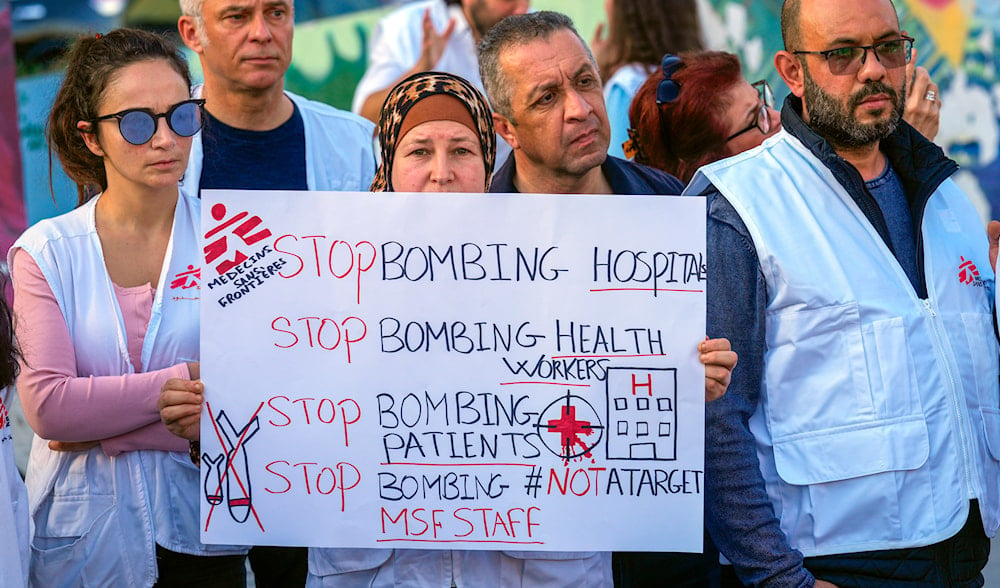MSF, IFRC urge immediate ceasefire, unimpeded humanitarian Gaza aid
The MSF calls out "Israel" for disregarding the order by the ICJ to “immediately” halt its military attacks in Rafah and let in humanitarian aid.
-

A member of the international humanitarian group Doctors Without Borders holds a placard during a protest at Martyrs' Square in downtown Beirut, Lebanon, Monday, December 4, 2023. (AP)
The Médecins Sans Frontières (MSF) organization called for an immediate end to the bombing in Rafah and Gaza, citing the United Nations Security Council meeting due to take place today Wednesday.
Chris Lockyear, MSF Secretary-General, said, "Civilians are being massacred. They are being pushed into areas they were told would be safe only to be subjected to relentless airstrikes and heavy fighting," adding, "Entire families, made up of dozens of people, are crowded into tents and living in extremely difficult conditions. Over 900,000 people were forcibly displaced again as Israeli forces intensified their offensive on Rafah in early May."
In a statement on Wednesday, the MSF relayed that staff and patients at an MSF-supported trauma stabilization point in Rafah's Tal al-Sultan were forced to leave the facility amid the increasing aggression only 24 hours after the IOF bombed tents in what it called a "safe zone", killing at least 49 people and wounding over 250 others.
The Israeli occupation army claimed responsibility for the strike, claiming it was a "precision" attack to assassinate Hamas members.
Dr. Safa Jaber, an MSF gynecologist who is in the Tal al-Sultan tents with her family, expressed. "All of last night we heard clashes, bombings and rockets being fired. Nobody knows what exactly is happening," noting, "We are scared for our children, scared for ourselves. We were not expecting this to happen suddenly. Where shall we go? We are struggling to find the basics that every human being needs to stay alive."
Read next: World calls for action after Israeli massacre in Rafah
The statement also called "Israel" out for disregarding the order by the International Court of Justice (ICJ) to "immediately" halt its military attacks in Rafah and let in humanitarian aid. With that being said, it described all nations supporting "Israel" as "morally and politically complicit."
It urged the United States, United Kingdom, and allied European Union Member States to pressure "Israel" to stop the blockades and attacks.
It added that the shutdown of the MSF-supported trauma point in Tal al-Sultan came after an Israeli airstrike on the Kuwaiti hospital in Rafah killed two staff and put the hospital out of service.
Karin Huster, MSF Project Medical Referent in Gaza, said, "Hundreds of thousands of civilians are being subjected to a brutal and relentless demonstration of collective punishment," adding, "Along with the bombings, the severe blockages of aid are making it impossible for us to help in a meaningful way. People are also dying because humanitarian workers are being prevented from doing their jobs."
"We call for all warring parties to respect and protect medical facilities, their staff, and patients... We call for Israel to immediately halt its offensive on Rafah and to open the Rafah crossing point to let in humanitarian and medical aid at scale," the organization said.
"We call for an immediate and sustained ceasefire throughout the Strip," it concluded.
Back in February, Lockyear addressed the UNSC, saying, "This Council should reject any resolution that further hampers humanitarian efforts on the ground and leads this Council to tacitly endorse the continued violence and mass atrocities in Gaza... The people of Gaza need a ceasefire, not when practicable, but now. They need a sustained ceasefire, not a temporary period of calm. Anything short of this is gross negligence."
IFRC calls for Gaza ceasefire
The International Federation of Red Cross and Red Crescent Societies (IFRC) called on Wednesday for a ceasefire and unimpeded humanitarian access to the Gaza Strip, where millions of people face worsening hunger amid a humanitarian catastrophe nearly seven months into the war on Gaza.
"We desperately need a political solution that will allow us to have a ceasefire to get aid in," IFRC President Kate Forbes told Reuters in an interview in the capital, Manila.
"We're ready to make a difference. We have to have access, and to have access there has to have a ceasefire," she added.
Describing the situation in Rafah as "atrocious" during a visit in February, months before Israel launched a military assault on the southern Gaza city, Forbes said, "There was no not enough housing. There was no water, there weren't enough sanitation toilets. We had a hospital with no equipment... and unfortunately what I was afraid of has happened, and that there wasn't going to be enough food."
"I plead with the governments on all sides to negotiate a ceasefire so that we can get aid in," she said.
"My job is to ensure that when it [ceasefire] happens, we can give the aid that's necessary. And so they need to do their jobs so I can do my job," the IFRC president added.

 5 Min Read
5 Min Read








